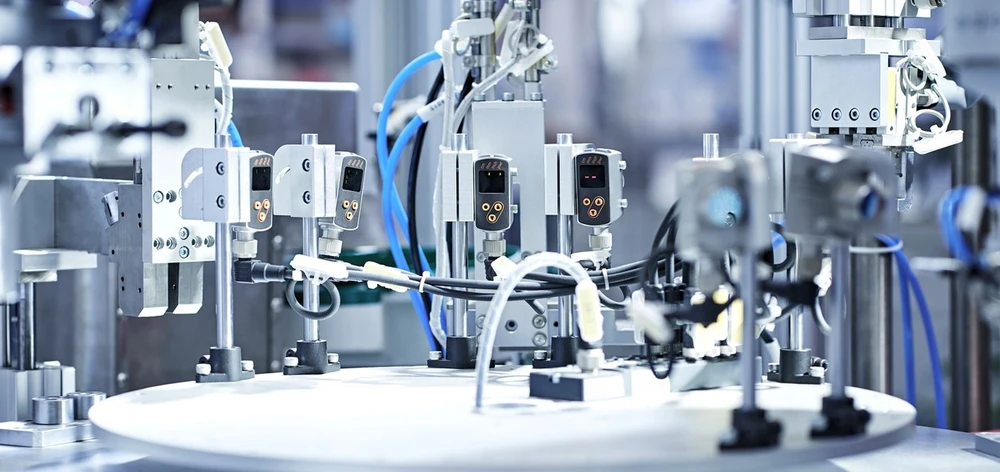CPQ Software for Complex Products: Is It Right for Your Business?
When you sell complex products with hundreds or thousands of variants, quoting becomes a high-stakes process.

When you sell complex products with hundreds or thousands of variants, quoting becomes a high-stakes process. Add in usage-based pricing, service bundles, multi-year contracts, and regional rules, and it’s easy to see why many manufacturers hesitate to adopt off-the-shelf configure, price, quote (CPQ) software for complex products. In fact, 43% of global manufacturing companies still rely on spreadsheets to manage quoting despite growing product complexity and rising buyer expectations.
This leads to the, sometimes, $1M question: Can commercial CPQ software really handle our level of complexity, or do we need to build something custom?
The short answer: not every CPQ system is designed for manufacturing, but the right one can support very advanced configuration and pricing. The key is knowing how to evaluate your complexity, choose the best CPQ, and address concerns from stakeholders who assume commercial tools can’t match custom systems.
Product complexity versus process complication and why it matters
Before you can determine whether CPQ software is the right fit, or which kind, you need to distinguish between product complexity and organizational complication.
- Complexity is the inherent, value-creating intricacy in your products or business model. Think custom engineering, multi-option configurations, or tiered service bundles. It’s a strategic asset.
- Complication, on the other hand, is self-inflicted. It stems from disconnected functions and teams, workflows in too many systems, unclear responsibilities, or manual processes that don’t scale. It adds friction that can’t be used as a competitive advantage.
CPQ software should help you master complexity, not automate complication. As you evaluate options, the goal isn’t to replicate what you’re doing today. It’s to simplify quoting by addressing what’s slowing your sales process, while also supporting the complexity that differentiates your business.
Is CPQ right for me? How to find the best CPQ software for complex products
The answer to “Is CPQ software right for your product?” depends largely on choosing the right type of CPQ. Different types of CPQ software work best for different industries and product types. For manufacturing, an industry-specific, CPQ-first software is essential to work with your specific programs along the value chain (e.g., PDM, PLM, supply chain management) and to execute on the constant innovation needed as the CPQ market evolves.
A custom tool might reflect how you quote today, but it often lacks:
- Flexibility to scale or support new sales channels
- Real-time pricing tied to global rules
- Visualization or self-service capabilities
- Resilience when key personnel leave
To decide on the best course of action, consider your needs based on your products, you pricing, and your current technology architecture.
1. Managing highly configurable products
First, assess the complexity of your products and selection process. Ask the following questions:
- Do product selections cascade through multiple subsystems?
- Are there compatibility constraints between components?
- Do configuration choices affect manufacturing processes?
- Can one component choice eliminate dozens of other options?
If you answered yes to multiple questions, your product likely requires constraint-based CPQ software.
- Rules-based logic dictates what component combinations are allowed. These rules are typically hardcoded—”if A, then B”—and require significant effort to create and maintain, especially as product portfolios grow or change.
- Constraint-based configuration, by contrast, doesn’t tell the system what works, it teaches the system why it works. Rather than writing individual rules for every valid combination, you define product logic in terms of constraints that will always be true (e.g., “the diameter of the washer must match the bolt”). The engine then evaluates options in real-time with less maintenance and more scalability.
Rules-based CPQ software is a fit when:
- Dependencies are relatively linear and predictable.
- You’re managing small- to mid-size assemblies with known constraints.
Constraint-based CPQ software is best when:
- Choices affect multiple layers of product logic simultaneously (e.g., motor selection affects power requirements, which affects panel sizing, which affects cooling requirements, which affects enclosure dimensions)
- Configuration requires calculation-based compatibility.
- Products are more heavily engineered-to-order or assembled-to-order.
2. Managing pricing sophistication
Pricing can be calculated at a multitude of levels, from channel, region, deal size, or billing model—OEM vs. dealer, subscription vs. one-time. Use the following questions to assess how sophisticated your pricing needs are, and whether your current process can support dynamic, accurate, and scalable pricing logic.
- Does pricing vary by region, contract length, or service levels?
- Do you offer usage- or performance-based pricing?
- Are there bundling rules or volume-based discounts that change dynamically?
The appropriate CPQ software should be able to:
- Allow pricing logic to be tied directly to configuration outputs.
- Support multiple pricing models, as well as service sales pricing and configuration.
- Integrate with ERP or CRM for dynamic, real-time pricing validation.
- Automate discount approvals and margin controls, flagging when margins don’t meet specific rep targets.
3. Managing complex integrations and supply chain connectivity
The buyer-centric smart factory connects front-end engagement (CRM) with back-end systems like ERP, PLM, and supply chain management to deliver complex products seamlessly. For manufacturers, integration requirements often determine whether CPQ software is viable.
Ask yourself:
- Does your sales process require live data from ERP, PLM, or inventory systems?
- Do sales, engineering, and operations rely on disconnected tools?
- Do different teams need tailored BOMs for quoting, production, and procurement?
A headless CPQ enables deep, flexible integrations across your tech stack. Unlike CPQ tools locked into a single software suite (e.g., ERP-first CPQs), headless platforms work independently and integrate broadly.
Look for a CPQ solution that can:
- Offer robust APIs and no-code connectors for real-time, system-agnostic integration.
- Sync with CAD, PLM, ERP, and MES tools.
- Automatically generate role-specific, line-by-line BOMs for sales quotes, engineering specs, manufacturing execution, and supply chain planning.
This ensures each function works from the same configuration logic while receiving the BOM that fits their workflow to reduce errors and speed handoffs.
Smarter CPQ for complex sales: Visual, flexible, AI-ready
Advanced CPQ capabilities can actually make complex products more accessible to buyers and sellers alike. Today’s CPQ platforms offer additional benefits that help sellers and buyers navigate complex product selection while reducing maintenance costs and resources to update the CPQ system.
- AI-powered product modeling streamlines rule creation and maintenance, making it easier to adapt to product changes
- Visualization and self-service quoting allow dealers or customers to engage directly with product options, increasing speed and confidence
- Dealer portals allow sales partners to configure, price, and quote your products with their own configured rules so that product information is always consistent.
Rather than simplifying your products, the right CPQ makes complex products easier to buy and sell.
Why building custom isn’t always better for complex products
While building a custom quoting tool may seem more flexible, the long-term costs often outweigh the benefits, especially for complex products.
- Implementation timeline: Commercial CPQ software can be deployed in months, not years.
- Total cost of ownership: Avoid the technical debt of maintaining a custom-coded system.
- Risk mitigation: Reduce dependency on key individuals and ensure business continuity.
- Ongoing complexity support: Commercial solutions evolve with market needs and technology advances.
How complex can CPQ software get? Real examples from Tacton customers
Global manufacturers with highly configurable products and intricate IT architectures are seeing real benefits from CPQ software made especially for complex configurations.
- Yaskawa manufactures up to 25,000 industrial robots annually, with over 120 base models each supporting a wide range of customer-specific variants, options, and add-ons. With their CPQ, Yaskawa now manages complex interdependencies, like component compatibility, language requirements, and ERP integration. Sales teams generate over 1,300 accurate quotes annually, often in real time, with ERP-ready BOMs and full technical validation.
- Siemens Energy’s subsystem, an air intake, has 120 variants. Across the full turbine, configuration complexity multiplies fast. Tacton’s constraint-based engine manages these interdependencies in real time to ensure technical accuracy and eliminate manual processes.
- For Meyn, quoting full poultry processing factories—up to 80 pieces of equipment—once took days or a full week. Since adopting Tacton CPQ, Meyn has reduced quote time by 60% and cut 85% of the clarifying questions needed to complete quotes.
- HMF Cranes has hundreds of configuration variables for each crane system, all needing to comply with varying truck models and regional regulations. A process that once included quoting in their ERP and Excel spreadsheets, with Tacton they could generate accurate quoting across global markets and onboard sales teams faster, supporting both internal teams and distributors.
- Tetra Pak sells complex processing and packaging systems requiring tight integration across a complex architecture of ERP, CRM, and PIM systems. Tacton CPQ became their single source of truth, unifying their global sales process to ensure optimal solutions every time.
- With a diverse global portfolio and highly engineered products, IMI replaced 200+ legacy tools with one Tacton CPQ platform. Now, they configure 50 product lines across fluid control within their CPQ software, reducing tool maintenance, enabling global standardization, and achieving 90% self-sufficiency in maintaining and adding new product and pricing logic.
A CPQ platform made for configurable and complex products
Tacton is a purpose-built CPQ buyer engagement software for complex product manufacturers. With a constraint-based configuration engine, deep integrations into manufacturing systems, and a proven ability to support sophisticated pricing and product models, Tacton helps manufacturers master complexity while driving out complication.
Learn more about Tacton CPQ software for complex products



